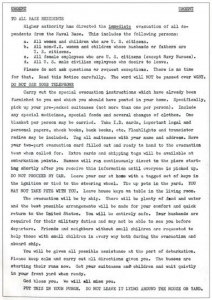“Put this in your purse. Do not leave it lying around the house or yard.”
National Dialogue and Traveling Exhibit

Archival document provided by Janet Miller, author of “Memories of Guantanamo Bay 1960 – 1962.” It is an evacuation notice received by Miller’s family at Guantánamo Bay naval base on October 22, 1962.
On October 22, 1962, Janet Miller received this one-page set of typewritten instructions for the evacuation of military dependents from Guantánamo Bay naval base (GTMO) in the midst of the Cuban Missile Crisis.
Janet and her children, along with the other dependents living at GTMO at the time, were told by an unspecified “higher authority” not to “ask questions or request exceptions. There is no time for that.” Instead, they were asked to proceed in an orderly fashion with their pre-packed luggage to their front yards and wait quietly for buses to take them to McCalla Airfield and then on to the U.S., where they would be “entirely safe.” The closing lines contain a haunting farewell, full of the anxiety that was surely felt by all the residents of GTMO: “God bless you. We will all miss you.” Janet and her family departed in a rush, leaving laundry on the clothesline and meatloaf on the counter, never to return to Cuba.
In its strange admixture of military precision, Cold War authoritarianism and paranoia, and compassionate, even tender wishes for the well-being of its recipients, this single sheet of paper seems to exemplify the strange liminal space that GTMO has occupied for more than 100 years.
It shows human compassion in a moment of impending nuclear war. It shows a community fearing for its own, and the frightening consequences of geopolitical maneuverings on individuals. It even speaks with its silences and omissions—the instructions only provide for the evacuation of U.S. citizens and their dependents, while local Cuban communities and contract workers would be left to fend for themselves.
I can imagine using a document like this one as a way to encourage dialogue among a variety of stakeholders, including military personnel and families, local communities, activists and other groups. It brings up themes such as:
- The multifaceted nature of GTMO’s history—what does it mean to understand this place as not only a projection of American military might, or a site of human rights abuses, but also as a home for many different people, including American civilians?
- The constantly changing nature of the place—GTMO means different things to different people at different times, and even more than one thing to the same person. How does this shifting nature change what stories we can or should tell about it?
- The effect of war and conflict on families, whether “powerful” or not—what does GTMO mean for those people who depend on it? What would it mean to “close” GTMO (again)?
Some historical artifacts require careful extended study before their meanings are revealed, but others practically cry out for interpretation, bursting at the seams with the burden of human experience. Dialogue is one way to release that experience, to examine it together and follow where it leads, to take its message in new directions, and to open new possibilities in the service of creating public memory.
By Evan Medley, public history student at Arizona State University
Arizona State University is participating in the Guantánamo Public Memory Project‘s National Dialogue and Traveling Exhibit. Opening at NYU’s Kimmel Center for University Life Windows Gallery in December 2012 and traveling to 9 sites (and counting) across the country through at least 2014, the exhibit will explore GTMO’s history from US occupation in 1898 to today’s debates and visions for its future. The exhibit is being developed through a unique collaboration among a growing number of universities as a dialogue among their students, communities, and people with first-hand experience at GTMO.
2 Comments to: “Put this in your purse. Do not leave it lying around the house or yard.”

March 29, 2012 1:56 pmLillian (Diaz) Carter wrote:
My mom, sister and I were one of the families that were evacuated on that day in Gitmo. While at the time I did not understand what was happening I do remember just being sad that my dad was not going with us. He was in the navy and of course had to stay behind. It was a wonderful day when we returned to Gitmo and my dad was there waiting for us!
October 20, 2012 8:59 pmCharles Dorsett wrote:
My father reported to Fleet Training Group, Guantanamo Bay Naval Base, Cuba in August 1962. My mother and three children had our travel orders to fly down to join him on October 22, 1962. Two days before that date she received a Western Union telegram from the Navy Department informing her that our travel had been cancelled due to “too much heavy traffic” proceeding to Guantanamo Bay. We had to wait until the President’s address to the nation to find out why. As we now know, the situation was resolved and dependents returned to the base. My family actually made it to the base just a few days before Christmas that year. Getting to be with our father after all we had experienced made it one of the best Christmases I can remember.